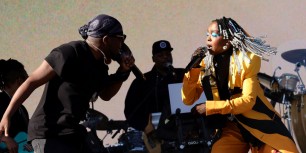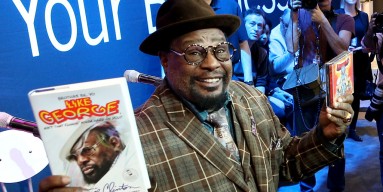Music Times wants to wish George Clinton, the iconic bandleader behind Parliament and Funkadelic, as well as the greatest figures in funk music history. We could spend thousands and thousands of words describing how great his bands were in the studio and live onstage...but that's a theme that's been reworked thousands and thousands of times. One subject that doesn't get as much respect is Clinton's influence on the world of hip-hop. If you don't believe us, just check out how many guest spots he's done for hip-hop tracks over the years, from Snoop Dogg to Tupac to Kendrick Lamar. We chose the biggest names that Clinton has worked with just to demonstrate how far and wide his appreciation in the genre stretches. The songs below are listed chronologically:
"Magilla Gorilla" by Kurtis Blow (1986)
Clinton's first work in hip-hop was far from the best he would turn out, although it can't be blamed too much on the funk master. Kurtis Blow has often been overshadowed in the minds of younger generations by acts such as Run D.M.C. and the Beastie Boys in terms of '80s hip-hop, but this emcee was the first to make it big, and the first to sign a major label. However, an almost-constant output of albums had left him sapped by the time 1986 came around. Kingdom Blow was a disgrace in the face of his previous output, full of kitschy raps such as "Magilla Gorilla." In case you thought the title was a metaphor of some sort...we wish. Unfortunately it's actually a hip-hop song focused on the biography of the Hanna Barbera character. It's possible that Clinton and his band could have taken that concept and turned out a funky anthem, as they'd done a thousand times before, but his backing vocals couldn't save Blow here.
"Sons of The P" by Digital Underground (1991)
What does the "p" in "Son of The P" stand for? We're not 100 percent sure, but there's a decent chance that the answer is "phunk." Those familiar with Humpty Hump won't be surprised that his act the Digital Underground has a feel for the funk, and therefore booked Clinton for his second hip-hop guest spot, on the title track from the group's sophomore album. There is a common belief that Clinton also co-wrote the collective's hit single from the album, "Kiss You Back." That's not exactly true, although he does receive a writer's credit because of the sample of Funkadelic's "(Not Just) Knee Deep" in the song.
"G Funk Into" by Snoop Dogg (1993)
It's appropriate that Clinton got a guest spot on Snoop Dogg's debut Doggystyle, even if was only during the introductory track "G Funk Intro." After all, Clinton and his bands were one of the driving factors behind the entire "G-funk" (or "gangsta funk") movement. Dr. Dre had birthed the concept with his 1992 album The Chronic, which featured a heavy amount of Parliament/Funkadelic samples, as well as other instrumentals that clearly took influence from the funk of yesteryear. Snoop, one of the funkiest rappers around, brought the man himself in for an appearance on his first record (also produced by Dre). The friendship and the vibe must have lasted for the emcee, as he had Clinton come back to do the introduction to his 2006 album Tha Blue Carpet Treatment as well.
"Can't C Me" by Tupac Shakur (1997)
One of the benefits to being cool with Dr. Dre sampling frequently from your back catalogue is that it gives you the opportunity to jump in with the biggest names in hip-hop during the '90s. That started with Snoop but soon Dre was working with another emcee, Tupac Shakur, and Clinton managed to secure a guest spot on All Eyez On Me, one of the bestselling hip-hop albums of all time. The Parliament leader's voice can be heard during the hook on the opening track to the second disc, "Can't C Me." Clinton would also get a songwriting credit on the track "Heartz of Men" (as did Bootsy Collins, Clarence Haskins and Bernie Worrell) as it featured a significant chunk of work from the core foursome of the funk powerhouse.
"Synthesizer" by Outkast (1998)
Clinton's work with Dre, Snoop and Tupac all made sense with regard to the trio's fascination with funk music and the resulting "G-funk" movement. One has to look at the lyrical subject matter of those three performers and wonder how in place the prime minister of Parliament really was. Therefore when Outkast came along during 1998 and grabbed the vocalist for "Synthesizer" for the duo's Aquemini, it felt much more natural. Outkast has always been about bending the expectations of Top 40 hip-hop, especially on this album, which was largely a complaint regarding "basic" rappers on the radio. If we could choose one word (aside from "funky") to describe Clinton, it would be "different," a general term that safely sums up the musician. Clinton feels right at home during the track. Big Boi would team up with Clinton again in the future for his solo track "Fo Yo Sorrows."
"Wolves" / "Tar Pit" by the Wu-Tang Clan (2007)
It can be tricky to keep track of who all performs on any given song by the Wu-Tang Clan, due to the large number of members in the Staten Island collective. Newer albums have gotten even more interesting as guest stars appear to work with the influential group. Clinton earned two spots on the 2007 album 8 Diagrams. First he provides a chorus for Method Man, Masta Killa and U-God during "Wolves," and then he joins Method Man to provide the hook for Cappadonna, U-God and Streetlife during the bonus track "Tar Pit." It was the culmination of years of working on side projects with the numerous members of the Wu, including RZA, Method and affiliate Killah Priest.
"Wesley's Theory" by Kendrick Lamar (2015)
Kendrick Lamar's To Pimp A Butterfly almost serves as a tour of black music history in the United States, blending jazz instrumentals, soulful moments and airing posthumous interviews with Tupac. No one said that it had to be chronological however, as Clinton is the first guest star to appear on the album opener, "Wesley's Theory." Clinton's vocal appearance proves that his music and that of his bands, still has relevance and influence among the biggest stars in black music today.














